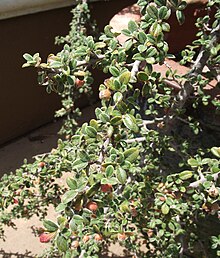Cotoneaster glaucophyllus
| Cotoneaster glaucophyllus | |
|---|---|

| |
| Scientific classification | |
| Kingdom: | Plantae |
| Clade: | Tracheophytes |
| Clade: | Angiosperms |
| Clade: | Eudicots |
| Clade: | Rosids |
| Order: | Rosales |
| Family: | Rosaceae |
| Genus: | Cotoneaster |
| Species: | C. glaucophyllus
|
| Binomial name | |
| Cotoneaster glaucophyllus Franch.
| |
| Varieties | |
| |
Cotoneaster glaucophyllus, commonly known as glaucous cotoneaster'[1] or bright bead cotoneaster, is a native plant of China and the Himalayas.[2]
Cotoneaster glaucophyllus is a spreading evergreen shrub growing up to 5 metres (16 ft) tall. The oblong leaves are 1.5–4 centimetres (0.59–1.57 in) wide by 3–8 centimetres (1.2–3.1 in) long, with hairy undersides when young. Clumps of red berries are produced after flowering.[3]
In Australia and New Zealand it is considered a weed.
Description
The plant is 4 metres (13 ft) tall with arched and erect branches which are greenish to purple-black in colour. Fertile shoots are 40–70 millimetres (1.6–2.8 in) long including two to four leaves. Its pedicels are 2–6 millimetres (0.079–0.236 in) long and are strigose. The leaves are dull to somewhat shiny and mid-green in colour with light green undersides. Flower buds are white, also the flowers, with a corolla 5–6 millimetres (0.20–0.24 in) wide. Fruits are globose, orange, and 6 millimetres (0.24 in) wide.[4]
References
- ^ "BSBI List 2007". Botanical Society of Britain and Ireland. Archived from the original (xls) on 25 January 2015. Retrieved 17 October 2014.
- ^ "Cotoneaster glaucophyllus". PFAF. Retrieved 9 April 2013.
- ^ "Cotoneaster". Taranaki Educational Resource: Research, Analysis and Information Network. Retrieved 2 December 2012.
- ^ Jeanette Fryer & Bertil Hylmö (2009). Cotoneasters: a comprehensive guide to shrubs for flowers, fruit, and foliage. p. 49. ISBN 9780881929270.
External links
 Media related to Cotoneaster glaucophyllus at Wikimedia Commons
Media related to Cotoneaster glaucophyllus at Wikimedia Commons Data related to Cotoneaster glaucophyllus at Wikispecies
Data related to Cotoneaster glaucophyllus at Wikispecies
